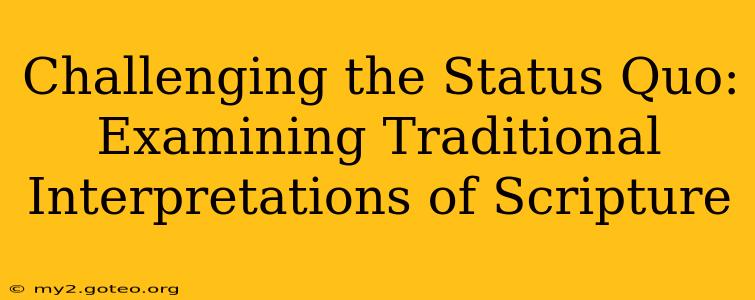For centuries, traditional interpretations of scripture have shaped religious beliefs and practices. However, a growing number of scholars and theologians are questioning these established viewpoints, prompting a crucial re-evaluation of sacred texts. This exploration delves into the complexities of challenging traditional interpretations, considering the historical context, evolving societal norms, and the ongoing quest for a deeper understanding of scripture.
Why Challenge Traditional Interpretations?
The need to challenge traditional interpretations often stems from several factors. Firstly, historical context plays a vital role. Interpretations that were acceptable centuries ago, based on the limited knowledge and societal norms of the time, may not resonate with contemporary understandings. Secondly, evolving societal norms challenge previously accepted interpretations. For instance, views on gender roles, social justice, and sexuality have shifted significantly, necessitating a reassessment of scriptural passages often used to justify discriminatory practices. Finally, new discoveries and scholarly advancements in areas such as archaeology, linguistics, and historical criticism offer fresh perspectives that can reshape traditional understandings.
What Methods are Used to Challenge Traditional Interpretations?
Several methods are employed to challenge established interpretations:
- Historical-critical method: This approach examines the historical context in which the text was written, considering the author's intentions, the audience's understanding, and the socio-political climate. It helps to uncover layers of meaning that might be obscured by later interpretations.
- Literary criticism: This method analyzes the text's literary features—structure, style, imagery—to understand its meaning and impact. It helps identify literary devices and rhetorical strategies that might have been missed in traditional readings.
- Feminist theology: This perspective challenges patriarchal interpretations of scripture, highlighting the experiences and voices of women often marginalized in traditional readings. It seeks to recover and re-interpret passages that have been used to subordinate women.
- Liberation theology: This approach focuses on the social and political implications of scripture, emphasizing its call for justice and liberation for the oppressed and marginalized. It seeks to use scripture to advocate for social change.
What are the Potential Risks and Benefits of Challenging Traditional Interpretations?
Potential Risks:
- Heresy accusations: Challenging established views can lead to accusations of heresy or undermining religious authority.
- Division within communities: Differing interpretations can create divisions and conflicts within religious communities.
- Loss of traditional identity: Shifting interpretations can lead to a sense of loss of traditional identity and community cohesion.
Potential Benefits:
- Deeper understanding of scripture: Challenging traditional interpretations can lead to a richer and more nuanced understanding of sacred texts.
- Increased inclusivity and social justice: New interpretations can promote greater inclusivity and social justice within religious communities.
- Relevant faith for modern world: Challenging established views can help make faith more relevant and meaningful in the contemporary world.
How Do We Navigate the Challenges of Reinterpreting Scripture?
Navigating the challenges requires a commitment to rigorous scholarship, open dialogue, and respectful engagement with diverse perspectives. It necessitates a willingness to embrace ambiguity and accept that multiple valid interpretations might exist. Crucially, it demands humility, acknowledging the limitations of our own understanding and the complexities of interpreting ancient texts within a modern context.
Are There Specific Examples of Traditional Interpretations Being Challenged?
Yes, many examples exist. Interpretations of passages related to slavery, women's roles, and homosexuality are frequently challenged. For instance, some scholars argue that certain passages previously used to justify slavery should be understood within their historical context, emphasizing the ethical imperative to abolish slavery. Similarly, passages often cited to restrict women's roles are being re-examined, highlighting the contributions of women throughout scripture and religious history.
What is the Role of Context in Interpreting Scripture?
Understanding the historical and cultural context is paramount. A passage written in a specific time and place may not translate directly to modern situations. Failing to consider this context can lead to misinterpretations and the application of ancient norms to contemporary issues without due consideration.
How Do Different Theological Perspectives Influence Interpretations of Scripture?
Different theological perspectives, such as literalism, contextualism, and postmodernism, significantly impact how scripture is interpreted. Each approach uses different hermeneutical lenses, leading to varied conclusions. Recognizing these differing perspectives is key to understanding the wide range of interpretations.
By engaging in critical analysis, thoughtful reflection, and respectful dialogue, we can continue to explore and refine our understanding of scripture, fostering a more inclusive, just, and relevant faith for all.

